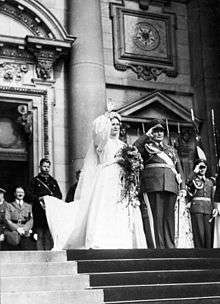Emmy Göring
| Emmy Göring | |
|---|---|
 Wedding photograph of Emmy and Hermann Göring in front of Berlin Cathedral, 1935. Hitler can be seen standing at the back. | |
| Personal details | |
| Born |
Emma Johanna Henny Sonnemann 24 March 1893 Hamburg, Germany |
| Died |
8 June 1973 (aged 80) Munich, Bavaria, West Germany |
| Nationality | German |
| Spouse(s) |
|
| Children | Edda Göring |
| Occupation | Actress |
| Known for |
Luftwaffe Commander-in-Chief Hermann Göring's second wife |


Emma Johanna Henny "Emmy" Göring (née Sonnemann; 24 March 1893 – 8 June 1973) was a German actress and the second wife of Luftwaffe Commander-in-Chief Hermann Göring. She served as Adolf Hitler's hostess at many state functions and thereby staked a claim to the title of "First Lady of the Third Reich".[1]
Biography
Emmy Göring was born Emma Sonnemann in Hamburg, Germany on 24 March 1893 to a wealthy salesman. After schooling, she became an actress at the National Theatre in Weimar.
Married life
On her marriage to actor Karl Köstlin in late 1916, she became Emmy Köstlin.
On 10 April 1935, she married the prominent Nazi and Luftwaffe chief Hermann Göring, becoming Emmy Göring. It was also Göring's second marriage; his first wife, Carin, had died in October 1931.[2]
Her and Göring's daughter Edda Göring was born on 2 June 1938. Edda was reported as being named after Countess Edda Ciano, eldest child of Benito Mussolini. Time reported: "Herr and Frau Göring became her fast friends."[3] However, in her autobiography, Emmy said her daughter was named after one of her friends.
Hermann Göring named his country house Carinhall after his first wife, while referring to his hunting lodge at Rominten (now Krasnolesye) – the Reichsjägerhof – as "Emmyhall".
Emmy was given an unsolicited membership to Nazi Party during Christmas 1938.[4]
"First Lady of the Third Reich"
Emmy Göring served as Hitler's hostess at many state functions prior to the Second World War. This and her claim to be the "First Lady of the Third Reich" created much animosity between herself and Hitler's mistress, Eva Braun, whom she snubbed and openly despised. Hitler consequently issued angry instructions to Hermann Göring demanding that Emmy treat Eva with more respect; one of the outcomes of Emmy's condescending attitude toward Eva was that she was no longer invited to Hitler's Bavarian retreat, the Berghof.[5] As for Eva Braun, she allegedly never forgave Emmy for having assumed the role of "First Lady of the Reich".[6][7]
As wife of one of the richest and most powerful men in Europe, she received much public attention, was constantly photographed,[6] and enjoyed a lavish lifestyle well into the Second World War. Her husband owned mansions, estates and castles in Austria, Germany and Poland and was a major beneficiary of the Nazis' confiscation of art and wealth from Jews and others deemed enemies by the Nazi regime. Her husband celebrated their daughter's birth by ordering 500 planes to fly over Berlin (he stated he would have flown 1,000 planes as a salute for a son).
After the end of the war, a German denazification court convicted her of being a Nazi and sentenced her to one year in jail. When she was released, 30 percent of her property was confiscated, and she was banned from the stage for five years, depriving her of a living.[8]
Later years
Some years after her release from jail, Emmy Göring was able to secure a very small DLA flat in a building in the city of Munich and remained there for the rest of her life.[8] In her final years, she suffered from sciatica. She wrote an autobiography, An der Seite meines Mannes (1967), published in English as My Life with Goering in 1972. She died in Munich in 1973.[8]
Emmy Göring is caricatured as the character "Lotte Lindenthal" in Klaus Mann's novel Mephisto: Roman einer Karriere (1936).
Selected filmography
- William Tell (1934)
References
Notes
- ↑ Gun, p. 127.
- ↑ Hamilton 1984, p. 109.
- ↑ Time magazine: "Lady of the Axis" published 24 July 1939.
- ↑ Klee, pp. 187-8
- ↑ Gun, pp.127-28
- 1 2 Gun, p.162
- ↑ The role of First Lady representing the regime was also bestowed upon Magda Goebbels. Beside having a close relationship with Hitler and hosting state events, she received letters from all over Germany from women with questions about domestic matters or child custody issues.Thacker 2010, p. 179; Longerich 2015, pp. 159, 160
- 1 2 3 Hamilton 1984, p. 110.
Sources
- Gun, N.E. (1968) Eva Braun, Coronet Books.
- Hamilton, Charles (1984). Leaders & Personalities of the Third Reich, Vol. 1. R. James Bender Publishing. ISBN 0-912138-27-0.
- Klee, E. (2007) Das Kulturlexikon zum Dritten Reich. Wer war was vor und nach 1945 (The Cultural Encyclopedia of the Third Reich. Who was What before and after 1945), S. Fischer:Frankfurt am Main. ISBN 978-3-10-039326-5.
- Longerich, Peter (2015). Goebbels: A Biography. New York: Random House. ISBN 978-1400067510.
- Thacker, Toby (2010) [2009]. Joseph Goebbels: Life and Death. New York: Palgrave Macmillan. ISBN 978-0-230-27866-0.
External links
| Wikimedia Commons has media related to Emmy Göring. |
- Emmy Sonnemann at the Internet Movie Database
- Photographs of Emmy Sonnemann
- Antic piano of Emmy Sonnemann